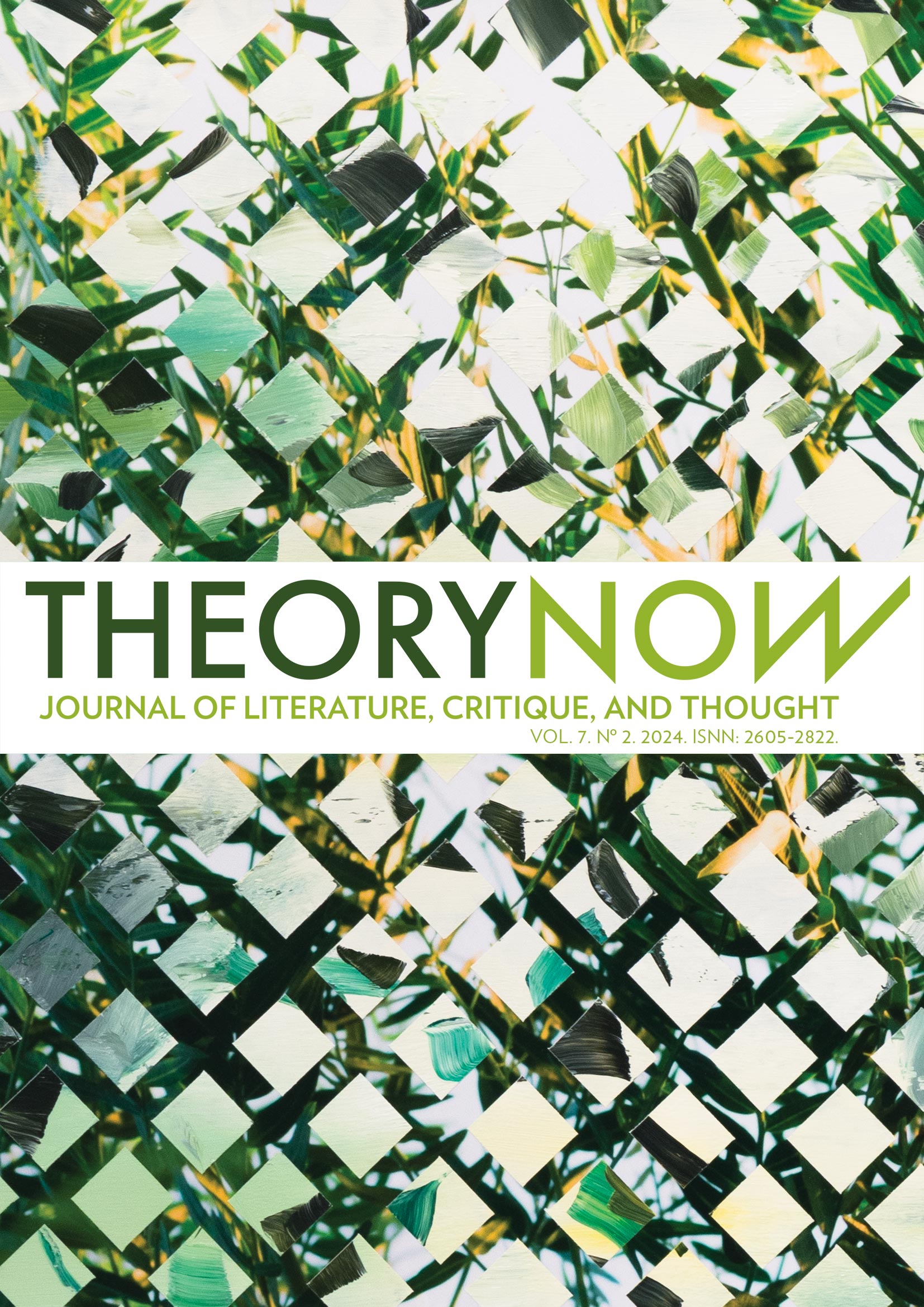The Theater of the Imaginary in Roland Barthes during the Seventies
DOI:
https://doi.org/10.30827/tn.v7i2.28895Keywords:
Roland Barthes, Theater, Imaginary, Orality, TeachingAbstract
In the introduction to the Spanish edition of the seminar How to Live Together, Alan Pauls proposes a very seductive idea on the evolution of Barthes' relationship with theater: if in the fifties theater was—thanks to his discovery of Brecht—the spearhead of a diatribe against bourgeois art, in the seventies, after a period of distancing from the Parisian scene that lasted for more than a decade, theater will return as a theoretical antidote that will help Barthes to distance himself from the rigid and abstract protocols of linguistics and semiology. In this paper I am interested in exploring this return of the theatrical imaginary as an idée-force intimately linked to the emergence of a materialist sensibility in his work of the seventies. I wonder what functions—metaphorical, explanatory, narrative—theatricality fulfills in his reflections on teaching, on the relation of writing with orality, with corporeal life and with the presence of others as a condition of possibility of every enunciative act.
Downloads
References
Amigo Pino, Claudia. “Roland Barthes professeur. Les stratégies didactiques des séminaires”. Apprendre et désapprendre. Les séminaires de Roland Barthes (1962-1977), Louvain-la-Neuve, Academia, 2022, pp. 21-37.
Barthes, Roland. “El teatro de Baudelaire”. Ensayos críticos. Traducido por Carlos Pujol, Barcelona, Seix Barral, 1967, pp. 53-61.
____. “El acto de escuchar”. Lo obvio y lo obtuso: Imágenes, textos, voces. Traducido por C. Fernández Medrano, Barcelona, Paidós, 1986, pp. 243-256.
____. “En el seminario”. Lo obvio y lo obtuso: Imágenes, textos, voces. Traducido por C. Fernández Medrano, Barcelona, Paidós, 1986, pp. 337-347.
____. Incidentes. Barcelona, Anagrama, 1987.
____. Écrits sur le théâtre. París, Éditions du Seuil, 2002.
____. Escritos sobre el teatro, traducido por Lucas Vermal y Ramón Andrés. Barcelona: Paidós, 2009.
____. Cómo vivir juntos: Notas de cursos y seminarios en el Collège de France, 1976-1977. Traducido por Patricia Wilson, Buenos Aires, Siglo XXI, 2003.
____. Lo neutro: Notas de cursos y seminarios en el Collège de France, 1977-1978. Traducido por Patricia Wilson, Buenos Aires, Siglo XXI, 2004.
____. La preparación de la novela: Notas de cursos y seminarios en el Collège de France. Traducido por Patricia Wilson, Buenos Aires, Siglo XXI, 2005.
____. Diario del duelo. Barcelona, Paidós, 2009.
____. “Del habla a la escritura”. El grano de la voz: Entrevistas 1962-1980. Traducido por Nora Pasternac, Buenos Aires, Siglo XXI, 2013, pp. 9-12.
____. “El adjetivo es el ‘decir’ del deseo”. El grano de la voz: Entrevistas 1962-1980. Traducido por Nora Pasternac, Buenos Aires, Siglo XXI, 2013, pp. 150-153.
____. El léxico del autor: Seminario en la École Pratique des Hautes Études, 1973-1974. Seguido de fragmentos inéditos de Roland Barthes por Roland Barthes. Traducido por Alan Pauls, Buenos Aires, Eterna Cadencia, 2023.
Barthes, Roland y Jean-Louis Bouttes. “Luogo comune”. Enciclopedia Einaudi, vol. 8. Turín, Einaudi, 1979, pp. 571-83.
Barthes, Roland y François Flahault. “Parola”. Enciclopedia Einaudi, vol. 10. Turín, Einaudi, 1980, pp. 418-37.
Barthes, Roland y Roland Havas. “Ascolto”. Enciclopedia Einaudi, vol. 1. Turín, Einaudi, 1977, pp. 982-91.
Barthes, Roland y Éric Marty. “Orale/scritto”. Enciclopedia Einaudi, vol. 10. Turín, Einaudi, 1980, pp. 60-86.
Carricaberry, Sebastián. “Reflexiones sobre el teatro en la obra de Roland Barthes”. Lindes, no. 2, 2011, pp. 1-13.
Consolini, Marco. “L’eccesso e la distanza. Roland Barthes e il teatro”. Sul teatro, Roland Barthes. Traducido por Laura Santi, Milano, Meltemi, 2002, pp. 9-26.
Dubatti, Jorge. “El teatro como acontecimiento”. Introducción a los estudios teatrales. México, D. F., Libros de Godot, 2011, pp. 35-138.
Foucault, Michel. Folie, langage, littérature. París, Vrin, 2019.
Marty, Éric. Roland Barthes, el oficio de escribir. Traducido por Horacio Pons, Buenos Aires, Manantial, 2007.
____. “Prólogo”. El léxico del autor: Seminario en la École Pratique des Hautes Études, 1973-1974. Seguido de fragmentos inéditos de Roland Barthes por Roland Barthes, Roland Barthes, Buenos Aires, Eterna Cadencia, 2023, pp. 7-18.
Pauls, Alan. “Prefacio a la primera edición en español”. Cómo vivir juntos: Notas de cursos y seminarios en el Collège de France, 1976-1977. Traducido por Patricia Wilson, Buenos Aires, Siglo XXI, 2003, pp. 11-21.
Rivière, Jean-Loup. “Préface”. Écrits sur le théâtre, Roland Barthes, París, Éditions du Seuil, 2002, pp. 7-16.
Sarrazac, Jean-Pierre. “Le retour au théâtre”. Communications, no. 63, 1996, pp. 11-22.
Torres Reca, Guillermina y Verónica Stedile Luna. “Cómo vivir juntos: método y utopía en el primer curso de Barthes en el Collège de France”. Boletín del Centro de Estudios de Teoría y Crítica Literaria, no. 22, 2023, pp. 156-171.
https://www.cetycli.org/publicaciones/boletines/76-boletin-22.html
Yelin, Julieta. “Escritura de vidas. Barthes y la animalidad”. Estudios de Teoría Literaria. Revista Digital: Artes, Letras y Humanidades, vol. 9, no. 19, 2020, pp. 218-228.
https://fh.mdp.edu.ar/revistas/index.php/etl/article/view/3542
Published
How to Cite
Issue
Section
License
Theory Now. Journal of Literature, Critique, and Thought is an immediate open-access publication which is available at no cost for readers and authors alike. Authors are not charged any kind of fee for the editorial processing of their articles. Reading, downloading, copying, distributing, printing, searching, linking or reusing all published articles for non-commercial uses is allowed on the condition of citing the author, the journal and the editing body. All intellectual material published in this journal is protected under a Creative Commons Attribution-NonCommercial 3.0 Spain license.
Dissemination of the articles in social (Facebook, Twitter, Linkedin, etc.) and scientific networks (ResearchGate, Academia.edu, etc.), public repositories at universities and other institutions, blogs, personal or institutional websites, Google Scholar, ORCID, ResearchID, ScopusID, etc. is strongly encouraged. In all cases, the intellectual property of the articles and any possible monetary profits derived from them belong exclusively to the authors.


















